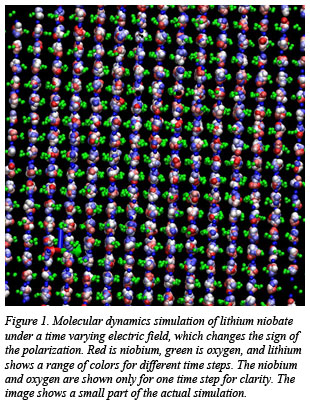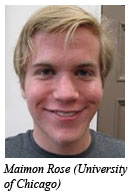 A new efficient way to pump heat using crystals has been discovered by Carnegie Summer Scholar Maimon Rose (University of Chicago) and Carnegie Staff Scientist Ronald E. Cohen. The crystals can pump or extract heat, even on the nanoscale, so they could be used on computer chips to prevent overheating or even meltdown, which is currently a major limit to higher computer speeds.
A new efficient way to pump heat using crystals has been discovered by Carnegie Summer Scholar Maimon Rose (University of Chicago) and Carnegie Staff Scientist Ronald E. Cohen. The crystals can pump or extract heat, even on the nanoscale, so they could be used on computer chips to prevent overheating or even meltdown, which is currently a major limit to higher computer speeds.
 The team performed simulations on ferroelectric crystals—materials that have electrical polarization in the absence of an electric field. The electrical polarization can be reversed by applying an external electrical field. They found that the introduction of an electric field causes a giant temperature change in the material, dubbed the electrocaloric effect, far above a temperature to a so-called paraelectric state.
The team performed simulations on ferroelectric crystals—materials that have electrical polarization in the absence of an electric field. The electrical polarization can be reversed by applying an external electrical field. They found that the introduction of an electric field causes a giant temperature change in the material, dubbed the electrocaloric effect, far above a temperature to a so-called paraelectric state.
The electrocaloric effect pumps heat through changing temperature by way of an applied electric field. The effect has been known since the 1930s, but has not been previously exploited. Rose and Cohen found that the effect is larger if the ambient temperature is well above the transition temperature, so low transition temperature materials are preferred.
Ferroelectrics become paraelectric, therefore they have no polarization under zero electric field above their transition temperature, which is the temperature at which a material changes its state from ferroelectric to paraelectric. This work was funded by EFree, an Energy Frontier Research Center headquartered at the Geophysical Laboratory. [M. Rose and R. E. Cohen, Phys. Rev. Lett. 109, 187604 (2012)].
